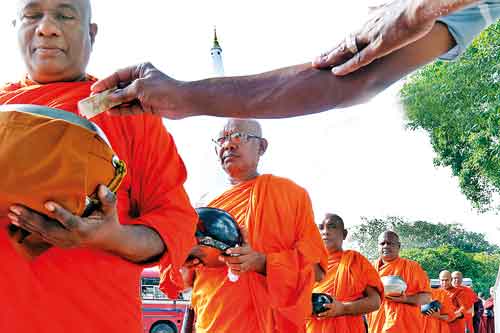Letters to the Editor
View(s): A letter by Dr. Chandima Weeraratne “The disappearing begging bowl and its abuse” in the Sunday Times of October 8, speaks a lot about the abuse of alms bowls by certain monks.
A letter by Dr. Chandima Weeraratne “The disappearing begging bowl and its abuse” in the Sunday Times of October 8, speaks a lot about the abuse of alms bowls by certain monks.I quote below from the Internet on the origin of the begging bowl: ‘What is Pindapatha’ (from http://sridharamawardhanaramayam.blogspot.com). ‘The word “pindapata” is elucidated in the Visuddhimaga as: “Alms food is any sort of food or nutriment is called “alms food” or pindapata – literally means “lump dropping,” because of its having been dropped (patitatta) into a bhikkhu’s bowl during his alms round (pindloya). Or alms food (pindapata) is the dropping (pata) of the lumps (pinda); it is the concurrence (sannipata), the collection, of alms (bhikkha) obtained here and there, is what is meant.” Pindapata, is the practice of collecting alms food, as observed by Theravada Buddhist monks who have gone forth from ‘home life’ to ‘homelessness.’
But Pindapatha or use of the alms bowl to collect money from public to pay fines of corrupt, convicted officials is not acceptable and it supports robbers which is against Buddhist principles. “No one should take anything belonging to others without permission”, is the Buddha’s preaching.
Regarding the last paragraph of his letter, priests accepting ‘money envelopes’ is acceptable in my opinion. During the days of the Buddha, there was no need for money for priests, as they were healthy at that time by taking part in Daana, made up of vegetables without insecticides and walking long distances for their daily routine preachings. But now the scenario is completely different. Most of the senior priests have many ailments, such as diabetes, high blood pressure, and arthritis etc., hence they need money for medicines. Young priests need money for their education – expenditure on travel by bus to the universities, purchase of books for their studies, to re-load their phones or internet cards (for studies), for meals at canteens during lecture time – all these cost money now. Therefore a cash donation is always helpful.
May all beings be happy and contented!
Sumith de Silva Kesbewa
New Constitution: Why has the interim report ignored submissions by the Malay community?
The Interim Report of the Steering Committee appointed to formulate a new Constitution has completely ignored the submissions made by the Malay community through the ‘Conference of Sri Lankan Malays (COSLAM)’. Sadly and most disappointingly, they have chosen not to mention ‘Malay’ even once in the entire 90 odd paged report.
Yet its intention given under “2) Province to be the Primary Unit of Devolution” states among other things “……Community Councils: Constitutional provisions shall be made to ensure that at various levels of government and in different geographical areas, the rights of communities which are minorities within such areas are protected”.
This is the closest anywhere in the new constitution that makes the Malays feel part of the term ‘minority community’ even though it does not elaborate further and also nothing is said about the community under the main framework of the proposals.
When the representatives of the Malay Community of Sri Lanka met two sub committees appointed for the purpose of obtaining individual or group proposals for the new Constitution, the urgent need to reserve a “Constitutionally Guaranteed” seat for the Malay community in the National List was put forward in earnest and much hope, giving the reasons for such an appointment to be made at least in the New Constitution, thereby making amends to the historical injustice being committed on this important community.
Now who are the people who did not bother to look into the genuine grievances of the community when they drafted the Interim Report? Did they even read through the deliberations made by a community which has been ignored for too long? Did they even know that there is a small but very significant community called Malays who are citizens of Sri Lanka and have been positively contributing in every segment of its national activities like, defence, sports, education and development?
The Malay community would like to hear from this Government or those who drafted this report without due consideration of this minority community numbering over 80,000 scattered throughout the country unable to elect a member of their own for the country’s legislature or other local bodies, just because they do not live in any particular area in larger numbers? Therefore, we Malays ask ourselves, are we to construe that the Interim Report renders the community unrepresented or unprotected under a future Constitution for Sri Lanka?
Anver Kamiss Colombo 5


